Contact information.
-
Address"Ekzarh Yosif" street, 31, 1000 Sofia, Bulgaria
-
Phone:+359 2 980 95 99
-
Websitewww.balkanservices.com
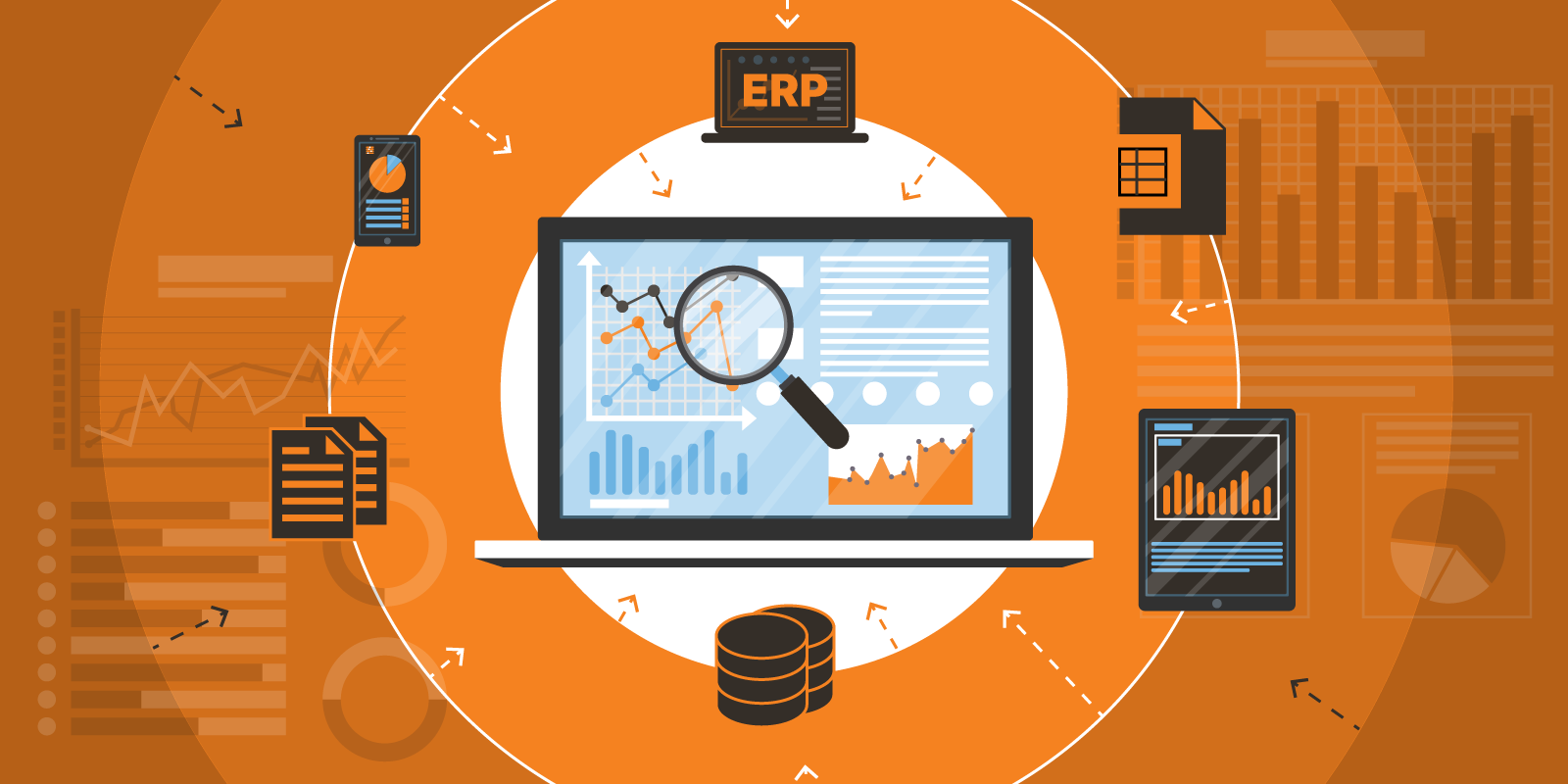
When a company is in its infancy, business processes are relatively simplified and straightforward, and data is just beginning to become available.
As the business grows, processes become significantly more complex, the volume of data grows exponentially, and mastering it becomes mission impossible. This is especially true with rapid growth and expansion.
At this stage of organisations’ development, modern technology comes to the rescue. Although choosing the right business software is a complex and difficult decision, it is critically important because nowadays no business can grow and be competitive in the market without the use of IT systems.
ERP (Enterprise Resource Planning) systems are a must for all companies that want to manage their company resources in an efficient manner.
ERP is a total business management software that automates and optimizes all the key processes in an organization.
Most large enterprises manage their operations with business software from globally recognized vendors such as SAP, Microsoft, Oracle or use a software product developed specifically for them.
Such solutions are sophisticated, with numerous functionalities, contain a rich set of business data, and most users find it difficult or waste a lot of time in finding the complete information they need at a given moment.
Over the past few years, our team has completed projects with a number of large enterprises. Our experience shows that one of the most common challenges for companies using high-class ERP solutions is the implementation of reporting, as data analysis is not the main function of these types of platforms.
Such integrated enterprise resource planning and management information systems provide a large set of operational reports, but face difficulties when management needs reports with data from different modules, consolidated information from different software systems or companies.
This creates the following difficulties for corporations:
Management, in turn, lacks direct and quick access to the necessary reports, analyses, key performance indicators and performance information on which to base management decisions.
Numerous reports and summaries are produced for management in Excel, Power Point or other formats that, however automated, require exports, manual processing or other intervention and support.
Business analytics solutions or so-called BI tools (from business intelligence) are a set of software tools that aggregate, unify, analyze, and visualize data from various internal and external sources.
They are the preferred tool of medium and large companies seeking better visibility, full traceability, and accountability of their activities down to the smallest detail.
With a BI platform, companies ensure quick, easy and timely access to company data at any point in time, saving management and key employees’ time. Dashboard from the BI platform Qlik Sense
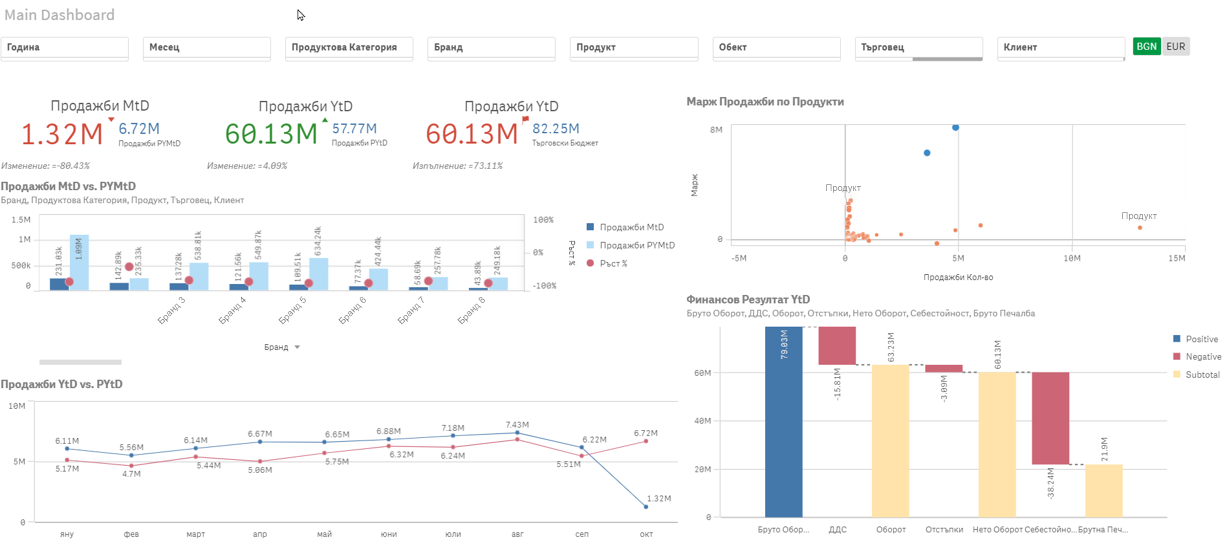
Our team is here to listen carefully and offer the right solution for you.

“The application I use the most is QlikView. It’s the one I care about the most” – this is what Mr. Krasen Kurkchiev, CEO of FICOSOTA – one of the leading FMCG companies in Bulgaria told Capital* some time ago.
The company is a favorite client of ours, and Mr. Kurkchiev’s words, in our opinion, are yet another confirmation of the key role of BI tools for effective and forward-looking management of large-scale businesses.
Why do leaders of large organizations rely on BI systems as their right hand? We summarized our observations and consulting experience on the reasons in the following 6 areas:
The BI tool eliminates the need to manually search, merge and unify data from disparate systems and thousands of spreadsheets. Dashboards, which visualize data from the information systems used in the company, provide a comprehensive view of the state of the business at any moment, based on up-to-date and correct data.
Business intelligence platforms answer questions about what has happened in the past, where the business is now, and with so-called predictive capabilities, where it might end up in the future – for example, how many customers the company might win or lose next quarter, what needs to be produced next week, etc.
Qlik Sense Dashboard
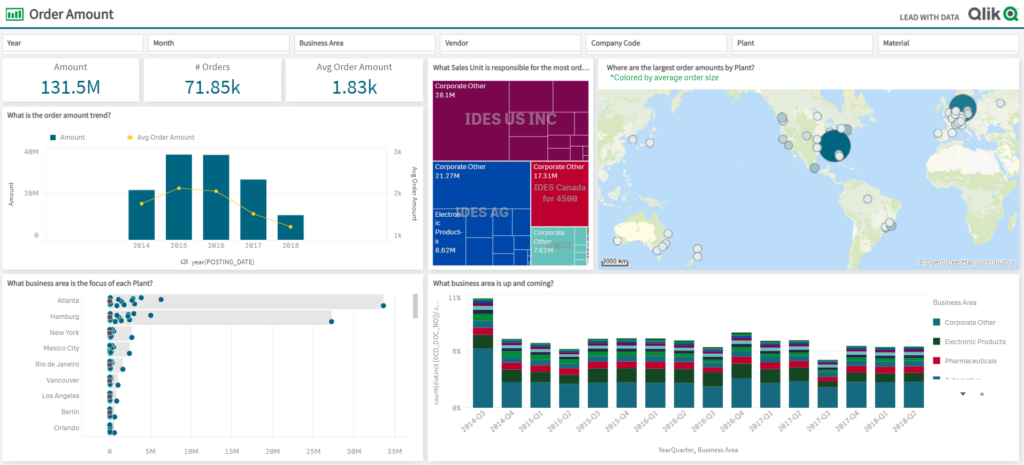
Business analytics systems save valuable time for management, business analysts and key figures in the company. BI minimizes errors, and prevents data duplication or manual processing gaps.
With such specialized reporting systems, a single version of the truth is guaranteed. By integrating BI as an ERP system upgrade tool, executives of large enterprises gain assurance that everyone in the company is working with the same data and reporting it in the same way.
Last but not least, business intelligence systems keep knowledge and data in the company, even after a key employee leaves.
Qlik Sense Dashboard
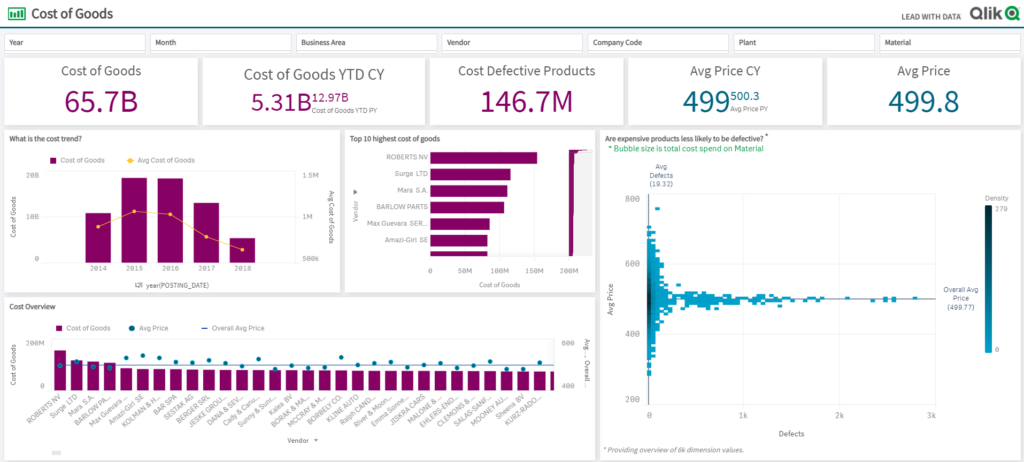
BI platforms allow easy and quick generation of a wide range of reports, presented in an understandable way in the form of clear graphs and visualizations that can be customized for users.
Depending on the volume of data in the company, calculating key business metrics and generating reports with an ERP system can take even a few days.
With BI, any key user can generate sophisticated and accurate reports with just a few clicks, without waiting for days to produce them. Business intelligence tools eliminate manual data processing, which frees up business analysts’ time to focus on important, high-value activities for the business.
Most BI applications are intuitive enough and using them does not require specialized technical skills.
Qlik Sense Dashboard
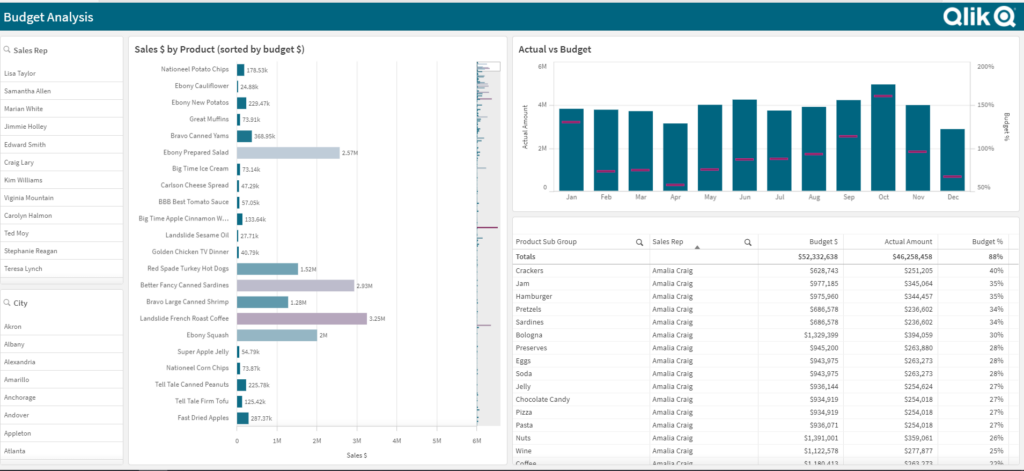
Business analytics systems greatly simplify the reporting process. They not only automate it, but integrate and unify all the information from all the business systems in the company. BI applications allow the accumulation of historical data, even from the company’s previous information systems.
According to the company’s needs, applications can be developed in the BI system that allow daily tracking and analysis in detail of:
Such functionalities are not ready modules in the system and not every BI platform allows their implementation. Their complexity necessitates the need for an experienced team with extensive expertise and know-how on best practices, but they have great added value for the business – improving visibility, traceability, and accountability.
Qlik Sense Dashboard
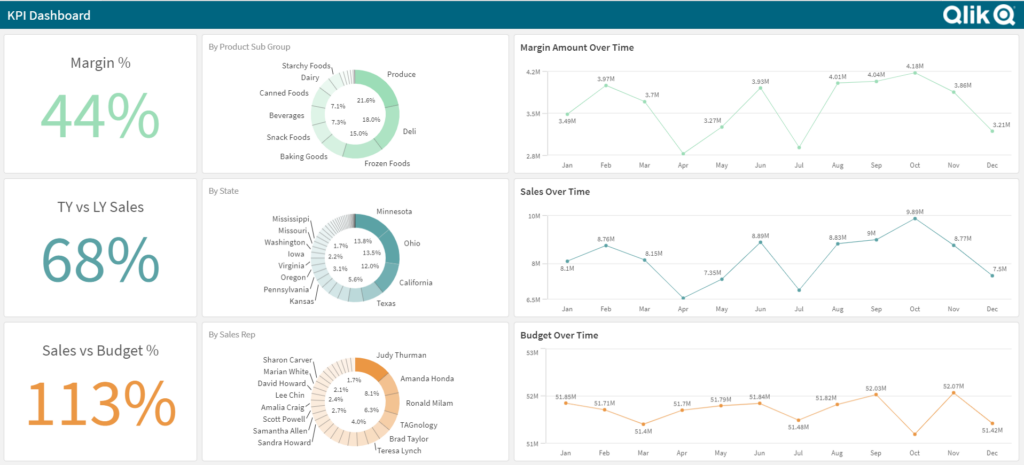
Businesses increase the value of their data by being able to analyze it at any time and from any device. Integrating data from a company’s core software systems with other types of data from sources such as social networks or the Internet of Things (IoT) can open up new business opportunities.
In addition to analyzing historical data, BI tools can use the data to predict future trends. For example, what are projected year-end sales based on the last six months’ figures?
Using BI at any point in time, forecasted versus actual data can be compared, to analyze where the company is in achieving goals and make informed decisions for follow-up.
Qlik Sense Dashboard
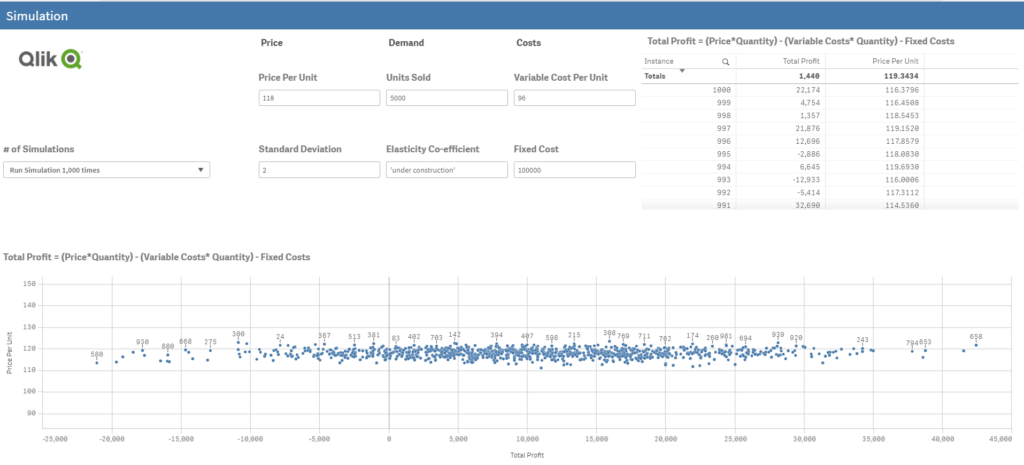
Even if data is seen as one of the most valuable assets in the company, there is a high probability that the benefit of having it is not maximised. Integrating ERP with a dedicated BI tool gives the company a rich set of systematized data and reliable information to be the basis for faster and more effective decisions.
As a result, core business processes are improved, while managers clearly see what action brings results and what does not.
Qlik Sense Dashboard
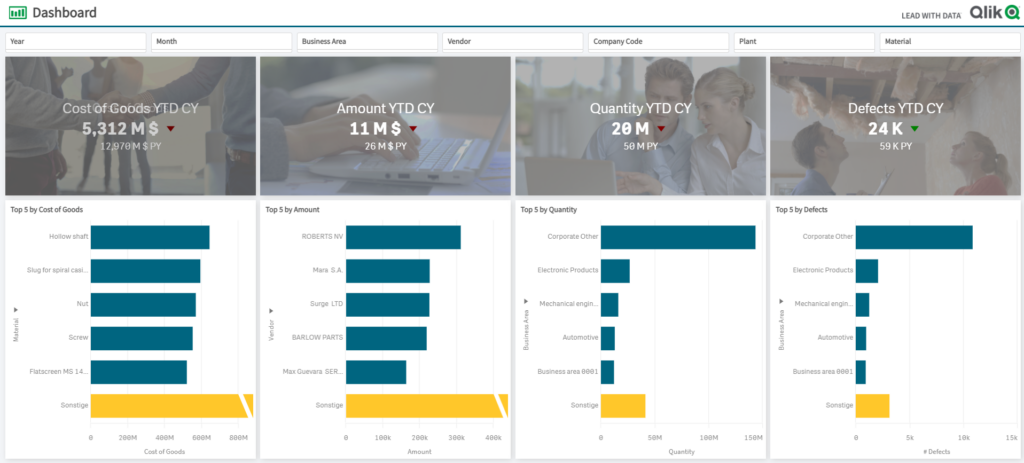
Implementing a BI system in large organizations operating with high-end ERP and an impressive volume of data is a complex process because as the business grows, business processes become more complex, and exceptions increase.
It is necessary to make sure that the implementer has expert knowledge of the area of activity and the specifics of the respective business, the technologies, and their capabilities, as well as previous experience in the implementation of similar projects.
Research and selection of a BI platform alone are not sufficient when the scale of activity is large. For corporations to benefit from the full potential of business intelligence systems, we recommend taking a holistic approach to implementation and creating a data and business analytics strategy.
When building the architecture of such a multi-layered solution, it is important to take into account the vision of the company, specifics and systems used, to apply a comprehensive approach that would cover every detail of the company’s processes.
Organizations with large-scale operations that already have and use BI systems mainly for graphs and beautiful visualizations, with separate applications developed for each report, also do not use the full potential of this type of system.
The true potential of business analytics systems is revealed when companies have comprehensive analysis, combined reports from different key performance indicators (KPI’s), can look at data from different perspectives and in different cross-sections. And all to be aligned with the organization’s strategy.
Business leaders with a modern vision who want to maximize the benefits of their ERP system can do so by choosing a modern reporting platform that complements the core business management system and significantly increases reporting and analytics capabilities.
It is desirable that the BI solution an organization chooses has the capabilities to:
However, not all BI solutions can meet these requirements. Without the right tools and processes, aggregating and unifying data can require too much manual labor and make reporting even more expensive.